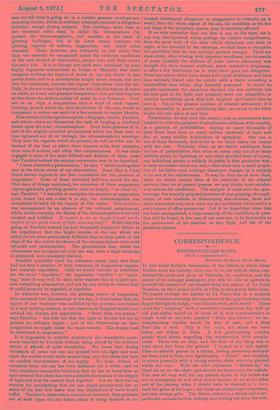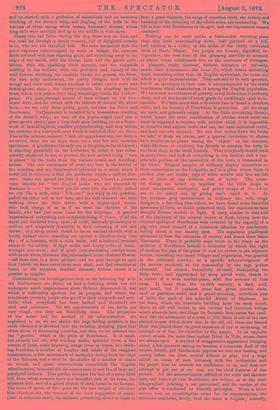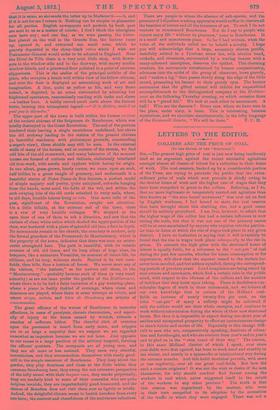CORRESPONDENCE.
BOURBONNE-LES-BA INS.
[FROM A CORRESPONDENT.]
Bourbonne-les-Bains, Haute Marne. IF you recall Bilzac'e description of the vehicle in which Oscar Ilusson made his unlucky debut clans la vie, the vehicle which con- stituted the pride and glory of Pierrotin its conductor, and the misery of its unhappy passengers, you will be able to picture to yourself the manner of our transfer from the station of La Fertti Bourbon, on the Chemin de Fer de l'Est, to this pretty little town. We passed through the barrier at La Fertit, and in a moment found ourselves reversing the experience of the ugly duckling when begot through the hedge, " out into the wide, wide world." There stood the "omnibus," with a wonderful construction like half an old post-chaise nailed on in front of it, with a protuberance in rough wood at one side, marked " Boite aux Lettres," an un- compromising wooden bench by way of seat, and a deep floor like a well. This is the coupe, for which we have taken our tickets in Paris. A few good-looking country people stood about, regarding the construction with compla- cence. There was no step, and the floor of the thing was at least three feet from the ground. I looked at it and sighed. Then an amiable person in a blouse, having previously surveyed me from head to foot, said significantly, " Tiene !" and vanished, to return presently with a strong wooden chair, which he planted beside the coupe. With the brief adjuration " Montez-lk," he lifted me up on the chair, and shoved me thence into the vehicle. This was all very well, but my gallant squire in the blouse was not to accompany us, and what was to become of me at the other end of the journey, when I should have to descend, in a town, amid the grins of the boys,—for there are always boys everywhere, and they always grin. The driver, attired in a blouse and a tar- paulin hat, mounted a little ricketty seat jutting out from the roof,
and we started, with a profusion of salutations and an immense cracking of the driver's whip, and jingling of the bells on the harness of three strong white horses, harnessed abreast, whose long tails were carefully tied up in the middle in wide bows.
Heavy rain had fallen during the day, there was no dust, and the road lay through a lovely country, full of delightful novelty to us, who are not travelled folk. We were enchanted with the great expanses uninterrupted by walls or hedges, the immense fields covered with fast-ripening grain, and stretching away to the
edges of the woods, with the abrupt hills, and the gentle undu- lations, with the sparkling little streams, and the vineyards nestling in the hollows, with the profusion and variety of the wild flowers studding the roadside banks, the grasses, the ferns, the rich tufty underwood, the pretty villages, each with its trough and draw-well, whose windlass is rolled over a worn and lichen-grown stone ; the cherry-orchards, the climbing apricot trees, whose rich yellow fruit hang temptingly beside the window- panes. We pass through several of these villages on our two- hours' drive, and are struck with the absence of animal life about them,—we see only three pretty goats, between La Ferte and Bourbonne. Our:approach is heralded by a tremendous cracking of the driver's whip ; we turn off the poplar-edged road into a grass-grown street,rpass a long dark-grey building, set in a frame- work of beautiful4trees, conifers preponderating, and atop before the archway of a courtyard, over which is inscribed Hotel des Bains. This is the anxious moment, I look out apprehensively, but there is no crowd, there are no boys, there are a very few and harmless spectators. A gendarme (the only one in the place, so far as I know) is standing peacefully on the kerbstone, in order, it was subse- quently explained to me, to prevent the new arrivals being " torn to pieces" by the touts from the various hotels and boarding- houses. The one excitement of every day here is the arrival of the omnibus, and my disinterested testimony to a scene which I never fail to witness, is that the gendarme enjoys a perfect sine- cure. Some one opened the door of the coupe, I heard a pleasant voice inquire for " two English ladies who are expected by Madame G—," the driver put his arms into the vehicle, pulled me out like a sack, with " V'lh une !" as a reply to the question, pulled my sister out in her turn, and the next moment we were walking down the little street with a bright-eyed bonne, who took charge of us as if we were the children of the family, who bad just come home for the holydays. A general impression of everything and everybody being al fresco ; of all the doors and windows being open'; of roofs, variously picturesque in outline, and singularly tbeautiful in their colouring of red and brown ; of a steep ascent closed in by an ancient church, with a boldly defined clocker standing out against a cloudless deep blue sky ; of a fountain, with a wide basin, and a battered terminal statue in the middle ; of ,high walls, and heavy grilles of finely- wrought iron-work ; and of great over-shadowing catalpa trees, with snow-white,blossoms like:etherealised horse-chestnut flowers, —all these seen in a mere glimpse, and we pass through an open door (which we have never'jiince seen shut), and find ourselves at home, in the sunniest, shadiest, cleanest, whitest rooms it is possible to imagine.
Commencing our investigations early on the following day with the Etablissement des Bains, we find a building which has not undergone much improvement since Diderot denounced it, but which is sufficiently spacious for its purpose, and where the attendants (country people who go off to their vineyards and corn- fields when everybody has been bathed and douched) are civil and attentive. All the appointments of the baths are very rough, but they are beautifully clean. The properties of the water and the method of its administration are explained to us, we are shown the huge boiling cauldron in the earth whence it is diverted into the twisting, gurgling pipes that climb about in distracting numbers, and then we are ushered into the "garden," which is the pride of Bourbonne. It is small, but cleverly laid out, with winding walks, splendid trees, a fine avenue of limes, some imposing orange trees in boxes, two drink- ing-fountains, a number of benches and tables of the roughest construction, a few monuments of antiquity dating from the days of the Romans, and a shed for the shelter of a number of chairs on wheels, and queer constructions remarkably like English wheelbarrows, intended for the conveyance to and fro of lame and paralysed bathers. This garden occupies the face of a steep little hill, from whose summit there is a beautiful view of the town, the adjacent hills, and of a grand stretch of dark forest on the horizon. The sense of space, of free, pure air, the vast height of the deep blue cloudless sky, the absence of the least suggestion of smoke (coal is unknown here), the stillness, permitting sound to reach us
from a great distance, the songs of countless birds, the variety and harmony of the colouring of the whole scene, are enchanting. We fell in love with Bourbonne on the spot, and our impressions remain unaltered.
Nothing can be more unlike a fashionable watering-place• than this little unpretending town, half perched on a hill, half nestling in a valley, in the midst of the richly cultivated lands of Haute Marne. The people are homely, dignified, in- dependent, one sees none of the grasping servility so common in places whose inhabitants live on the concourse of strangers. A pleasant, ready courtesy, without intrusion or curiosity, marks their demeanour,—the bonne foi, which means something more, something other than its English equivalent, the bonne aloi which is quite untranslatable. They are said to be very ignorant, but if so. ignorance in their case is unaccompanied by the stolid brutishness which characterises it among the English population.. We have seen no evidences of poverty, every little street is perfectly clean, and all the houses of every grade lie confidingly open to in- spection. We have never seen a drunken face or heard a drunken voice, and the honesty of Bourbonne is proverbial. All the shops are open, and generally empty. At the little circulating library, which boasts the usual combination of articles which every one must be supposed to require, with articles which it is impossible to conceive that anyone could ever use, we have unlimited credit, and keep our own account. No one ever writes down the books we take or those we return, and a general invitation to choose- such articles as we please among the " objets" on the counters,. while Madame is receiving her friends or nursing her baby in the back shop, is the usual formula. That everybody should walk in everywhere and look at everything is the fashion, and a con- siderable portion of the commerce of the town is transacted in the street. Elegant samples of millinery display themselves on their mannequins on the footpaths, and in a place where there is neither dust nor smoke, caps of white muslin and lace are loft out of doors all day without risk of injury. The queer- est things are mixed up together in the little shops in most unexpected contiguity, and pretty scraps of bric-a-brac are to be poked out by giving one's mind to it. In the common grey earthenware in ordinary use, with rough designs in a fine deep blue colour, we have found some beautiful specimens of form, no doubt preserved since the excavations here brought Roman models to light. A story, similar to that told of the discovery of the mineral waters at Bath, relates how the springs of Bourbonne were revealed by the sagacity of a pig, who cured himself of a cutaneous affection by assiduously rolling about in one marshy spot. The sagacious quadruped• attracted in time the attention of society, and hence these Bains- Thermaux. There is probably some truth in the story, as the archives of Bourbonne include a document by which the right of sending the pigs of the place to root for acorns in the adjacent forests, extending over many villages and seigneuries, was granted in the sixteenth century, as a specific acknowledgment of the service rendered to the community by the sage porker aforesaid. The church, beautifully situated, dominating the little town, and approached by steep paved ways, stands in• a corner of a wide market-place, with fine avenues of lime trees. It dates from the twelfth century, is dark, cold, and small, but it contains some fine green marble slabs, used as partition-walls, and a grand-sounding, melodious peal of bells, the spoil of the splendid Abbey of Morimon.
the front, where the venerable building faces the steep street, above an old wall buried in the various and luxuriant foliage which abounds here, and flings its fantastic lines across the road- way, like the adornment of a town en fete, there is one of the rare pierced crosses which shows that in the old, old times the Sacred Host was placed there on great occasions of joy or mourning, of triumph or of fear, for adoration by the people. In an opposite corner stands the more than modest Hotel de Ville, whose doors are always open. A sentinel of unaggressive appearance lounging about, a few peasants resting on benches, a numerous flock of the tamest, fattest, and handsomest pigeons we ever saw feeding and cooing before the door, several kittens at play, and a huge rabbit on terms of such intimacy, with the authorities and the people that he extends his conhdence to us, and does not attempt to get out of our way, are the chief features of this picture. All the announcements affixed to the walls and shutters here, and indeed all over Bourbonne, are written, or at the most lithographed ; printing is not patronised, and the service of the post office is conducted ou friendly principles. When a letter arrives with an unintelligible name for its superscription, the directrice concludes, firstly, that the name is English; secondly,
that it is mine, so she sends the letter up to Madame G—'s, and if it is not for me I return it. Nothing can be simpler or pleasanter for all parties. English newspapers and packets by book post are sent to us as a matter of course ; I don't think the aborigines saver have any ; and one day, as we were passing the letter- box placed on the wall in the Grande Rue, the facteur came up, opened it, and extracted one small note, which he gravely deposited in the shiny-black cabas which I wish our Postmaster-General would order to be adopted in England. Near the Hotel de Ville there is a very neat little shop, with flower- pots in the window-sills and in the doorway, with snowy muslin window-blinds, and a pinewood floor polished to a point of extreme slipperiness. This is the atelier of the principal cobbler of the place, who occupies a bench well within view of his fellow-citizens, and over the door is displayed an astonishing work of art and imagination. A lion, quite as yellow as life, and very fierce indeed, is depicted, in an arena surrounded by admiring but frightened spectators, remorselessly rending with tusks and claws —a leather boot. A boldly curved scroll curls above the furious brute, bearing this triumphant legend :—"Il le dichire, mais it tie peut pas is dicoudre."
The upper part of the town is built within the former enceinte of the ancient chateau of the Seigneurs de Bourbonne, which was totally destroyed in the Great Revolution. The zeal of the patriots hindered their leaving a single escutcheon undefaced, but above the old archway leading to the stables of the present chateau
The great efficacy of the waters of Bourbonne in muscular affections, in cases of paralysis, chronic rheumatism, and especi- ally of injury to the bones caused by wounds, attracts a number of sufferers hither. The cheerful click of crutches upon the pavement is heard from early morn, and cripples are in so large a majority that we suspect we are regarded -somewhat as impostors because we are not lame. Just opposite to our rooms is a large pavilion of the military hospital, forming the officers' quarters. The occupants are all young men, and they are all more or less maimed. They seem very cheerful, ,nevertheless, and they accommodate themselves with ready good- will to the simple resources of Bourbonne. They limp about the garden, they play dominoes and chess at the little tables, they consume Strasbourg beer, they sweep the not extensive perspective of the hilly street with their longues-vues, they smoke perpetually, they are tenderly kind to some of their comrades who are quite -helpless invalids, they are imperturbably good-humoured, and the -demon of Boredom does not visit them ever so lightly or briefly. Indeed, the delightful climate seems to banish boredom from every one here; the content and cheerfulness of the natives are infectious. There are people to whom the absence of salt-spoons, and the presence of Liliputian washing apparatus would suffice to obscure all the beauties of nature and all the treasures of art. To such I do not venture to recommend Bourbonne. Nor do I say to people who cannot enjoy life " without its pleasures," come to Bourbonne. It is a small and monotonous place. So far I bad written, when the voice of the multitude called me to behold a novelty. I hope you will acknowledge that a large, accurately shaven poodle, tastefully attired in a Tyrolean straw hat, with tricolor band, cockade, and streamers, surmounted by a waving banner with a many-coloured inscription, deserves the epithet. This charming creature, his movements unrestrained by human companionship, advances into the midst of the group of observers, bows gravely, and " makes a leg," then passes slowly along the edge of the little crowd, presenting his banner to their greedy eyes. The banner announces that the gifted animal will exhibit his unparalleled accomplishments to the distinguished company at the Etablisse- ment on the following Thursday evening, on which occasion there will be a "grand bal." We look at each other in amazement. A ball ! Who are the dancers ? Every man whom we have seen in the place, under sixty, is lame. This is interesting, because mysterious, and we ejaculate simultaneously, in the lofty language of the Eatanswill Gazette, " We will be there." F. C. H.




































 Previous page
Previous page